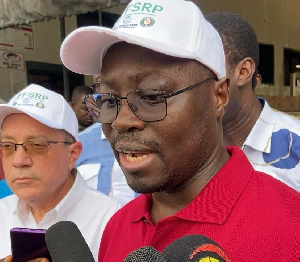The Ministry of Food and Agriculture (MoFA) is collaborating with various donor partners to introduce a Scaling Seeds and Technologies Partnership in Africa intended to accelerate smallholder farmers access to transformative agricultural technologies.
The partnership, funded by USAID, is to be implemented in the country by the Alliance for a Green Revolution in Africa (AGRA), under a 47-million-dollar project that would also be implemented in six African countries over a period of three years.
Governments from Ghana, Ethiopia, Malawi, Mozambique, Senegal and Tanzania, would be assisted to strengthen their seed sectors and promote the commercialisation, distribution and adoption of quality seeds of superior varieties and other key technologies for small-holder farmers.
MoFA, in collaboration with International Food Policy Research Institute (IFPRI) opened a two-day workshop on Tuesday in Accra to bring together 150 stakeholders from ministries, agencies, research institutions, international development organisations and universities to deliberate on how the programme should be implemented in Ghana.
Participants would identify key technologies and innovations, identify potent regions in Ghana to implement activities of the partnership and provide relevant information to stakeholders about available opportunities for support by the Partnership.
Dr Ahmed Yakubu Alhassan, Deputy Minister, in charge of Crops, MOFA, said over the years, improved seeds and other technologies had been introduced to Ghanaian farmers by national research efforts complemented by international research programmes.
He said efforts of extension services and series of externally funded projects had all improved seed varieties like Obatampa and Mamaba maize that had been widely adopted by farmers in Ghana.
“Often, however, the rise in yields associated with the introduction of new seeds has proven to be short-lived and national average yields have remained substantially below potential yield levels.”
He said the persistent “yield gap” were also a result of inadequate supply of certified seeds, the inability of farmers to apply recommended levels of fertilizers and other agronomic practices as well as undeveloped markets to handle the increased production.
Dr Alhassan said the Partnership was, therefore, important and that the stakeholders’ workshop would help generate some consensus among participants to deliver technologies to farmers in a much more consistent manner.
He said there was also the need to pay attention to the output market to ensure that farmers were able to sell their produce at a good price.
Dr Kwasi Ampofo, Country Representative of AGRA, said in a speech read for him that AGRA, with support from Feed the Future through USAID, is conducting the programme as announced in July 2013 as a contribution to the New Alliance for Food Security and Nutrition.
The New Alliance, which is a shared commitment of G8 partners, African leaders, and private sector partners, aims to lift 50 million people in sub-Saharan Africa out of poverty by 2022.
Dr Ampofo expressed AGRA’s confidence that the new programme would enhance the coordination of stakeholders’ activities in the value chain and assist in rapid deployment of on-the-shelf technologies that would raise agricultural productivity, food security and incomes of millions of farmers.
“This will add a strong impetus to the efforts of AGRA and other stakeholders in the sector leading ultimately to low food prices for consumers and providing further evidence that Ghana is poised to achieving a green revolution,” Dr Ampofo said.
Mr. John Brighenti, Agriculture Officer, Economic Growth Team, USAID, said the Partnership “represent a true partnership between governments and private sector, championed by the people who are together adopting country driven approach to developing and improving agriculture production.”
He said the Partnership would align the commitment of Africa’s leadership to drive effective country plans and policies for food security; partner with the private sector to increase investments where conditions were right and the commitments of G8 to expand Africa’s potential for rapid and sustainable growth.
The Scaling Seeds and Technologies Partnership will help strengthen seed sectors including regulatory systems and create new local seed companies, ensuring that game-changing technologies could reach and improve the lives of millions of smallholders, he said.
Regional News of Wednesday, 12 February 2014
Source: GNA












